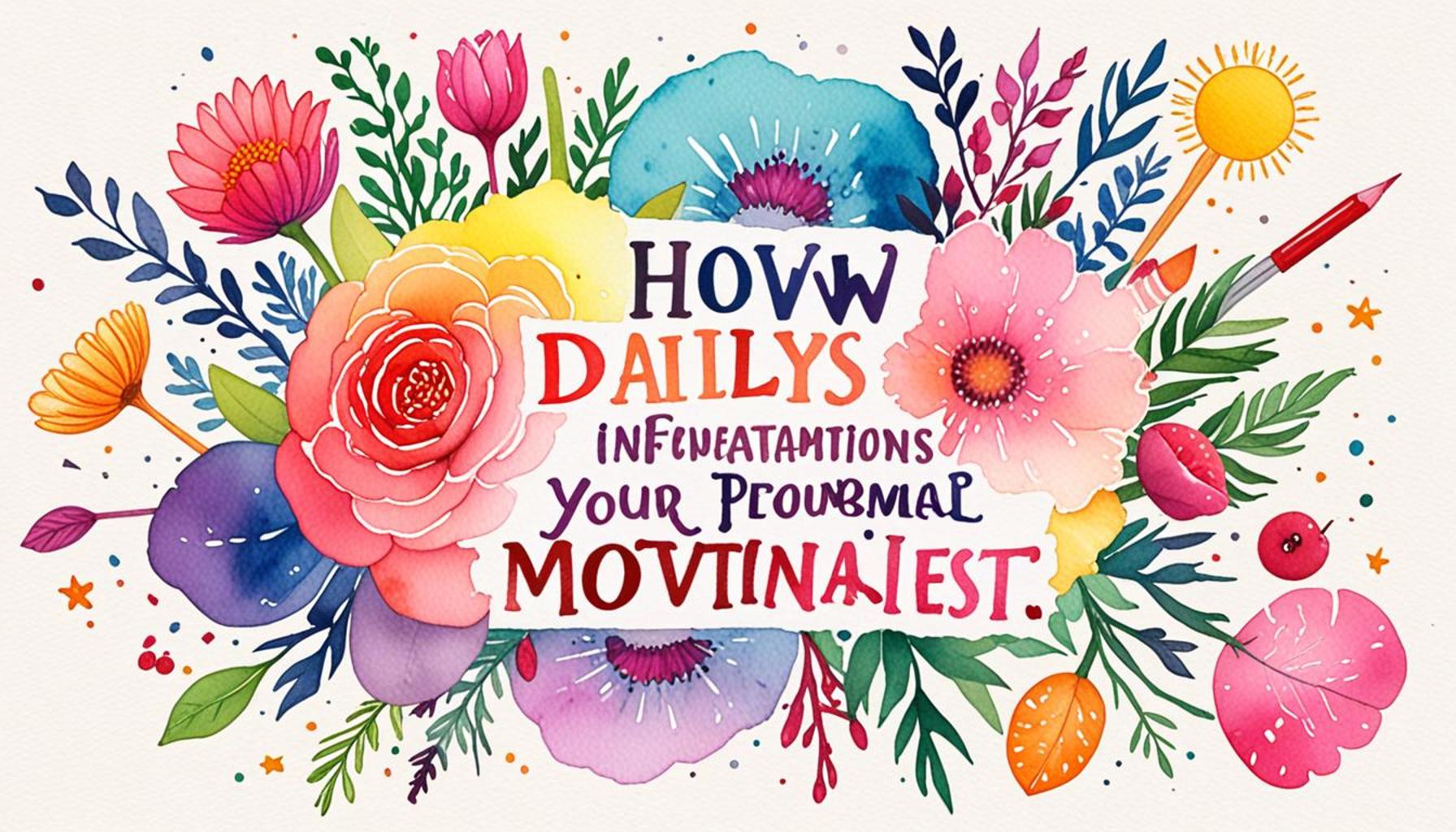The Role of Positive Affirmations in Promoting Mental Health and Well-Being in Nigerian Communities

Understanding Positive Affirmations
The phenomenon of positive affirmations is rooted in the psychological understanding that self-talk can significantly influence our emotional state and behavior. This method, originally popularized by psychologists like Louise Hay, emphasizes the idea that speaking kindly to oneself can reshape one’s mindset. In a world filled with challenges, especially within the Nigerian context, these affirmations provide a much-needed counter-narrative to negative thoughts. For instance, a common affirmation—“I am enough”—serves to counteract self-doubt which is prevalent among individuals facing societal and economic pressures.
The Impact on Mental Health
As mental health issues rise globally, Nigeria is no exception. Many individuals struggle with anxiety, depression, and low self-esteem often exacerbated by societal expectations. Positive affirmations are increasingly recognized as a proactive method to foster mental health and well-being. By repeating affirmations such as “I am capable of achieving my goals,” individuals can cultivate a more optimistic outlook. This is particularly beneficial in Nigerian communities, where a traditional view of mental health often stigmatizes those seeking help. Yet, embracing affirmations as part of daily practices could serve to normalize the conversation around mental health.
Promoting Resilience and Growth Mindset
In environments where resilience is paramount, like many Nigerian towns and cities, positive affirmations can encourage a growth mindset. This is the belief that abilities and intelligence can be developed with effort and perseverance. For example, children learning in challenging environments can benefit from affirmations like “Mistakes help me learn.” Such statements help foster resilience, encouraging young minds to embrace challenges rather than shy away from them.
Community Integration of Affirmations
Throughout Nigeria, community leaders are taking the initiative by incorporating affirmations into local workshops and events. For instance, during traditional ceremonies, it is common for elders to share statements of strength or encouragement tailored to the community’s challenges. These practices align seamlessly with modern positive affirmations, reinforcing their cultural relevance. The adaptation of affirmations in various Nigerian languages, such as Yoruba or Igbo, further supports this integration, making them accessible and relatable.
In summary, as Nigerian society gradually embraces the holistic benefits of mental wellness, the role of positive affirmations is becoming increasingly vital. By uniting traditional and modern practices, communities can foster greater individual and collective resilience, paving the way for improved mental health outcomes across the nation. Understanding and promoting these intersections will ultimately illuminate pathways to a brighter future for many Nigerians.
ADDITIONAL INSIGHTS: Expand your understanding here
The Repercussions of Negative Mindsets
In Nigeria, many individuals grapple with the burden of societal expectations that often foster a negative mindset. Factors such as economic hardship, cultural pressures, and the stigma associated with mental health issues contribute profoundly to this. The repercussions of these negative thought patterns can be disheartening, leading to heightened feelings of anxiety and inadequacy. Surveys indicate that approximately 29% of Nigerians experience mental health disorders, yet a vast majority remain untreated, largely due to the reluctance to seek help.
Positive affirmations act as a psychological toolkit against this tide of negativity. By intentionally choosing to focus on uplifting self-statements, individuals can gradually dismantle the mental barriers that inhibit their growth. Affirmations like “I am worthy of love and respect” or “My voice matters” instill a powerful sense of personal value that many may lack. For instance, stories from local communities highlight how adopting such affirmations has transformed individuals from feeling powerless to becoming catalysts for change within their environments.
Integrating Affirmations into Daily Life
Utilizing positive affirmations does not require extensive resources; rather, it can be seamlessly integrated into the fabric of daily life. Here are some practical ways Nigerians can incorporate affirmations into their routines:
- Morning Rituals: Starting the day with affirmations can set a positive tone. Individuals might recite “Today, I will thrive” as they begin their day.
- Journaling: Writing down affirmations can reinforce their impact. Keeping a dedicated journal to list daily affirmations encourages reflection.
- Family Gatherings: Sharing affirmations with family members during gatherings fosters communal strength and encourages open conversations about mental health.
- Online Platforms: Utilizing social media to share affirmations can create a ripple effect, encouraging peers to adopt positive thinking habits.
Barriers to Acceptance
Despite the benefits, many Nigerians still face barriers to accepting positive affirmations as a legitimate means of improving mental health. Traditional beliefs often prioritize physical and spiritual well-being over emotional health, making it challenging to embrace mental health practices. Furthermore, a lack of awareness regarding the effectiveness of positive affirmations can lead to skepticism. Engaging respected community leaders in discussions about the role of affirmations may help bridge this gap and normalize the use of mental wellness techniques in everyday life.
As Nigeria navigates the complexities of modern life amid enduring traditions, the integration of positive affirmations into community practices can significantly enhance mental health and well-being. Recognizing the need for mental resilience, and the actionable steps that can be undertaken, is crucial in paving the way for a healthier society. The potential for positive change is immense, and communities can harness this momentum by fostering a culture of self-affirmation and support.
| Advantages | Details |
|---|---|
| Improved Self-Esteem | Engaging with positive affirmations can significantly enhance an individual’s perception of self-worth, leading to improved mental health. |
| Enhanced Coping Mechanisms | Utilizing consistent positive affirmations can empower individuals to deal with stress and anxiety, fostering resilience within Nigerian communities. |
| Promotion of Community Support | When shared in group settings, positive affirmations help cultivate a supportive atmosphere, encouraging collective mental well-being. |
In examining the role of positive affirmations within Nigerian communities, it is essential to note that these affirmations do not merely serve as words of encouragement; they can actively transform the mental landscapes of individuals. As community members begin to embrace affirmations that resonate with their experiences, they foster a culture of positivity. This method aligns closely with traditional practices where communal support is paramount for overcoming challenges. Moreover, the increasing emphasis on mental health awareness in Nigeria underscores the need for practical tools such as positive affirmations to combat the stigma surrounding mental health issues. By incorporating these tools into everyday life, individuals can contribute to building a healthier society that values emotional and psychological well-being. In this context, the ripple effects of positive affirmations can extend beyond personal growth, impacting family units and entire communities.
YOU MAY ALSO LIKE: Read read another article
Building a Community of Support through Affirmations
One of the hallmark strengths of Nigerian culture is the sense of community and togetherness that binds people across different backgrounds and regions. This intrinsic value can be harnessed to amplify the impact of positive affirmations. When communities unite around the practice of affirming one another, it can create a ripple effect that reaches far beyond the individual. Group activities centered on affirmations foster a supportive environment where mental health can be openly discussed and prioritized.
Artisan groups, market associations, and local NGOs within Nigerian communities are ideal platforms for initiating affirmation circles. These gatherings can serve as safe spaces where individuals express their aspirations and challenges, while affirming each other’s value and potential. Research indicates that collective reinforcement of positive self-views significantly boosts emotional resilience. For example, local women’s empowerment groups use weekly meetings to rotate the responsibility of leading sessions focused on positive affirmations tailored to their experiences, such as “I am capable of achieving greatness.” This practice strengthens solidarity and encourages personal growth.
The Role of Technology in Affirmations
As technology continues to shape every facet of life, its integration into mental health discussions, particularly concerning positive affirmations, is noteworthy. Mobile applications and social media platforms have the potential to spread awareness of positive affirmations across Nigeria’s diverse landscape. Platforms like WhatsApp and Facebook have become avenues for sharing inspirational content that motivates and uplifts individuals facing mental health challenges.
Recent initiatives in urban centers, such as Lagos and Abuja, have witnessed the establishment of online mindfulness groups where members engage in daily affirmation practices. These digital communities not only democratize access to support but also allow for anonymity, encouraging those reluctant to speak about their feelings in public settings. A study by the Nigerian Psychological Association indicated that online groups resonate well with younger populations, with over 60% of participants acknowledging an improvement in their mental health through regular affirmation exercises.
Culture-Sensitive Approaches to Affirmation
Recognizing the importance of cultural contexts in the acceptance of positive affirmations is crucial. In many tribes, the use of proverbs and folklore is paramount in conveying wisdom. Integrating traditional wisdom into affirmations can make them more relatable and effective. For instance, a local Yoruba proverb that says “A man who uses his mouth to speak well is a man who can build a house” can be transformed into a powerful affirmation like “I build my world with my words.”
By coupling contemporary affirmations with cultural narratives, individuals can feel a sense of belonging and relevance. This creates an environment where affirmations are viewed as extensions of existing cultural practices rather than foreign concepts. Thus, culturally sensitive affirmations can enhance community acceptance and involvement, ultimately promoting broader mental health initiatives.
Furthermore, incorporating positive affirmations into school curriculums presents another promising channel for fostering mental well-being among Nigerian youth. Initiatives that focus on affirming students’ abilities, such as through art or performance, can help instill a positive self-image from an early age. Schools in regions like Enugu have started weekly “affirmation assemblies” where students share personal affirmations, creating a culture of support and encouragement that is likely to resonate throughout their lives.
YOU MAY ALSO LIKE: Read read another article
Conclusion: Embracing the Power of Positive Affirmations
In a world increasingly attuned to the significance of mental health, the role of positive affirmations in Nigerian communities cannot be overstated. By leveraging communal ties, technology, and cultural narratives, these affirmations can nurture mental well-being and resilience among individuals. As explored throughout this article, the integration of affirmations into community gatherings and digital platforms provides vital support systems that uplift and empower. The direct correlation between collective affirmations and heightened emotional resilience underscores the strength found in unity and shared experiences.
Furthermore, by sensitively adapting affirmations to reflect local traditions and values, individuals can develop a deeper connection to their identities, making the practice not just beneficial but also culturally relevant. This approach fosters engagement, making mental health discussions more accessible and relatable. Highlighting the examples from schools and community groups showcases how affirmations can shape the narratives of the younger generation, promoting healthy self-images from an early age.
As we move forward, the challenge lies in sustaining this movement through education and advocacy. Stakeholders, including educators, mental health professionals, and community leaders, must champion the cause of positive affirmations as a cornerstone of mental health initiatives. The potential for positive change is vast, and by cultivating a culture of affirmation, Nigerian communities can pave the way for improved mental health outcomes for all. In recognizing the profound impact of words, we can harness them as tools for building a brighter, healthier future.


